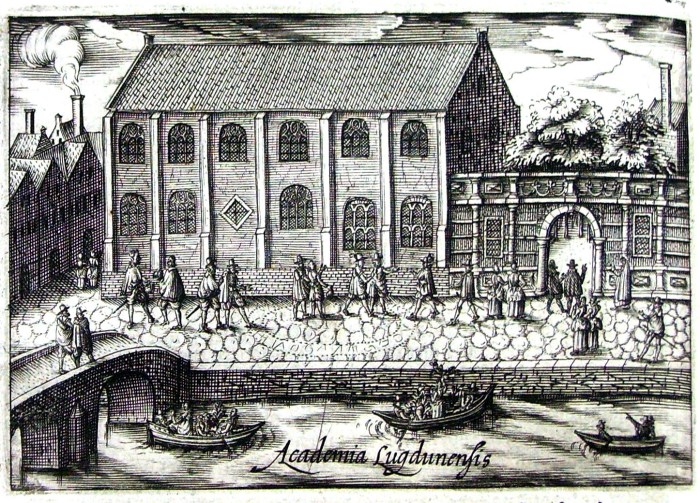
The Pilgrims and The University of Leiden
Rev. John Robinson, the Pilgrims' pastor, participated in the theological disputes about predestination and free will taking place in the University of Leiden. These arguments were a continuation of theological conflict between professors Jacobus Arminius and Franciscus Gomarus. The positions taken had immediate political consequences and attracted such international attention that at one point King James I of England intervened to express his displeasure about a professorial appointment. Robinson was a friend of the Contra-Remonstrant professor Johannes Polyander. Robinson is said to have debated victoriously against the Remonstrant professor Simon Episcopius. Polyander, who wrote the introduction to one of Robinson's books published by William Brewster, must have been involved in obtaining permission for the Pilgrims to hold their services in a room in the Begijnhof Chapel, which after the Reformation had been rebuilt to house the University's anatomy theater, library, and lecture rooms (besides a room for practicing fencing).
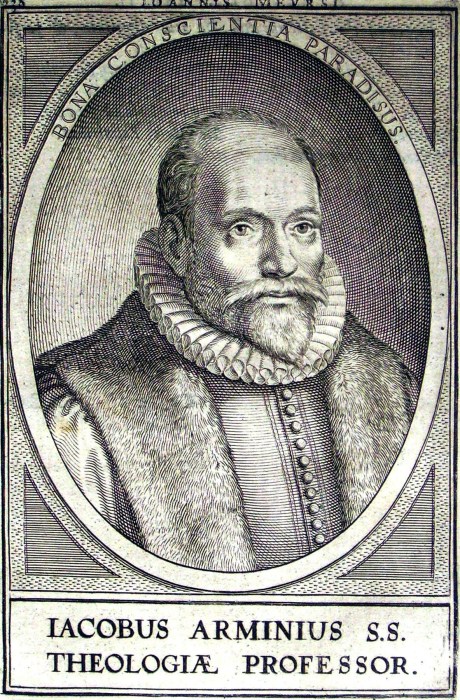
JACOBUS ARMINIUS (b. Oudewater, 1559; d. Leiden, 1609). Professor at Leiden, 1603-1609. While he was a student at Marburg, Arminius' family was killed in the massacre of Oudewater by the Spanish in 1575. He studied further at Marburg, Leiden, Basel, Zurich, and Geneva, where his teacher was Calvin's successor Beza. Arminius returned to Amsterdam in 1588 to become a minister in the Dutch Reformed Church. There he married Elizabeth Reael, whose father had been a lay leader of the Dutch refugee church at Emden, where plans for establishing the Reformed Church in The Netherlands were made at the Synod of Emden (1571).
Leiden's city secretary Jan van Hout, who later granted permission to the Pilgrims to come to Leiden, had also fled to Emden at this time. While a minister in Amsterdam, Arminius corresponded with such friends as J. Wtenbogaert and J. van Oldenbarnevelt. He also wrote a major commentary against the views on predestination held by the Cambridge Puritan William Perkins (Arminius' comments were published posthumously in Leiden, 1612). The Pilgrim minister John Robinson was a student and follower of Perkins. Appointed professor at Leiden in 1603, Arminius defended a moderate theological and political position opposed to that of Gomarus and the Puritans. He favored toleration and revision of the Reformed credal formulations where they seemed not to be in accordance with Scripture. When charged by the Reformed Synods of North and South Holland to write a "refutation" of the "errors" of the Mennonites, he never got around to composing it. In Amsterdam Arminius had opposed the church organization ideas of the English "Brownist" Separatists, who had arrived there before the Pilgrims, and he even visited some of them representing the Reformed Church, to ask the Brownists to stop holding sermons in their own houses. The Pilgrims, who had friends among Amsterdam's Brownists, were quite familiar with Arminius' theological views and ideas on the subordination of congregations to the civil magistrate for settling religious differences when pastors were to be chosen. The Pilgrims were strongly opposed to Arminian ideas.
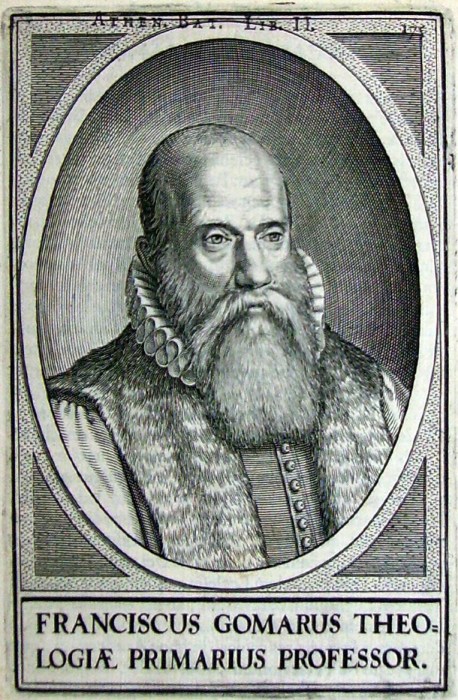
FRANCISCUS GOMARUS (b. Bruges, 1563; d. Groningen, 1641). Professor at Leiden, 1594-1611; Middelburg 1611-1615; Saumur, 1615-1618; Groningen, 1618-1641.The Calvinist Gomarus family fled from Bruges ca. 1578 to the Palatinate (Germany). Franciscus studied at Strasbourg, Neustadt, Oxford, Cambridge, and Heidelberg. He was pastor of the refugee Walloon church at Frankfurt/Main from 1587 until he became professor at Leiden in 1594. While at Leiden he was recommended in 1607 to preach in English for the Puritans, before they had their own minister. Gomarus had increasing doctrinal differences with his university colleague Arminius. Their disputes centered on "Predestination" (God's ability to determine the course of history from the beginning, including the selection or predetermination of individual people for salvation, and also the selection of political rulers).
Arminius considered that the logical conclusion of Gomarus' ideas, which were shared by John Robinson's Cambridge teacher William Perkins, was that God was the origin of sin. Involved in the question of Predestination was the government's role in church affairs. Thus these disputes were political as well as theological. Gomarus maintained that ministers were responsible first to their church boards and commissions and their credal formulations, and not primarily to the civil government. This position had been developed among the French-speaking Reformed in Northern France and Wallonia (S. Belgium), where congregations and ministers organized themselves within regional church districts ("classes") in order to withstand opposition and persecution from Catholic civil government officials.
Gomarus strongly opposed Arminius' followers, the Remonstrants. He was one of the most important participants in the "Pamphlet War" during the Leiden period of the Pilgrims. The Pilgrims' own publishing occurred in the midst of this larger Dutch controversy. Gomarus was not fully in agreement with Pilgrim ideas, for he opposed separation and Puritan Sabbath theories. Gomarus married Anna Marie de la Noye; a possible relative of hers was Philip de la Noye (Delano), who joined the Pilgrims and emigrated to America.
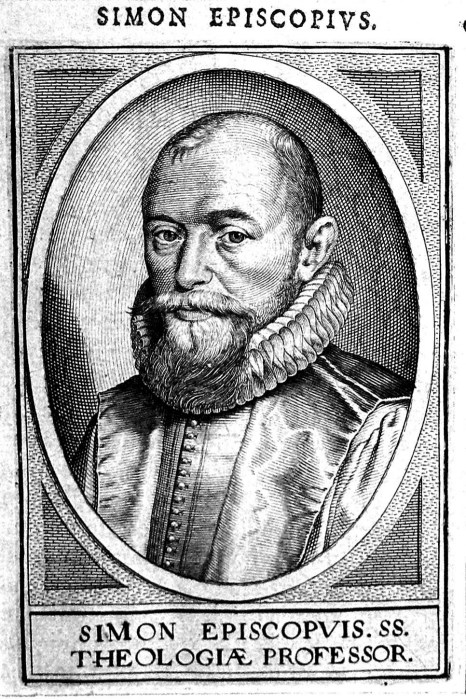
SIMON EPISCOPIUS (b. Amsterdam, 1583; d. Amsterdam,1643). Professor at Leiden, 1612-1619. He studied at Leiden, 1600-1609, and at Franeker in 1609. Episcopius was Arminius' best student. With J. Wtenbogaert he became a leader of the Remonstrant party. While professor he was on good terms with Polyander, although they held opposite views on the major theological and political issues of the time. With growing tension between Remonstrants (the Arminians) and Contra-Remonstrants (the Gomarists), from ca.1617 on, the Walloon students in theology were forbidden to attend lectures by Episcopius. He was banished, together with the other Remonstrant ministers, by the Synod of Dordrecht in 1619.
The expelled Reformed Remonstrant ministers founded the Remonstrant Brotherhood while in exile (the denomination still exists). The political consequence of the power-takeover by the Gomarists within the Reformed Church could be seen in the beheading of the nation's highest civil official, Johan van Oldenbarnevelt, Arminius' old friend.
Prince Maurits, the nation's highest military officer, supported the Gomarist clergy and staged a kind of coup d'état in which a brief military dictatorship, besides executing Oldenbarnevelt, removed all Remonstrant civil officials, replacing them with Contra-Remonstrants. From then on, the Gomarists were willing to allow the magistrates to take part in selecting ministers for their cities' congregations, but only to the extent of giving final approval to the clergy's choices among themselves. Episcopius lived in exile in Waalwijk, Antwerp, Cologne, Rouen, and Paris, where he preached with Wtenbogaert in the house of the exiled Dutch jurist Hugo Grotius. Prince Maurits died in 1625 and was succeeded by his brother Frederick Hendrick, who was favorable to tolerating Remonstrants. In 1626 Episcopius and Wtenbogaert returned to Holland, coordinating the various Remonstrant congregations spread throughout the country while living safely in Rotterdam. In 1634 the Remonstrants founded their seminary, now part of the University of Leiden, and Episcopius was appointed its first professor, a position he held until his death.
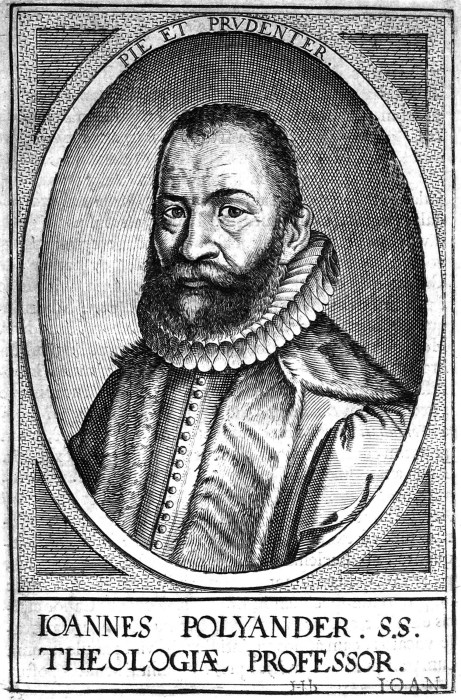
JOHANNES POLYANDER A KERKHOVEN (b. Metz, 1568; d. Leiden, 1646). Professor at Leiden, 1611-1646. His family, originally from Ghent, fled via Lorraine to the Palatinate and in 1570 to Emden, where his father was minister of the refugee Walloon church and secretary of the Synod of Emden (1571). Polyander was a student at Bremen, Heidelberg, and Geneva (at the same time as Arminius) From 1591 until 1611 Polyander was minister of the Walloon church at Dordrecht.
While professor in Leiden, he was a good friend of John Robinson, and even wrote an introduction to one of Robinson's own books published in Leiden by Brewster. Polyander was also a friend of Hugh Goodyear, the Leiden English Puritan minister. Polyander's son (Johannes a Kerkhoven) was Dutch ambassador to England and married Lady Katherine Stanhope. Polyander was a member of the Synod of Dordrecht that banished Episcopius and the other Remonstrant followers of Arminius.
The Synod appointed Polyander to be one of the translators of the authorized Staten Vertaling of the Bible. Bradford wrote many years later that Polyander had attended services in the Pilgrim congregation and that Polyander had invited John Robinson to dispute publicly with Episcopius in university debates.
A similar statement was made by a Dutch writer in the seventeenth century, independently of Bradford's report, which suggests that some such disputation probably did take place. Presumably the debates were among those held for theological students within the theological college of the States of Holland (part of the University of Leiden), and not technically public. The epitaph of Polyander is in the Pieterskerk, as is the funerary effigy of his son, a masterpiece by the sculptor Rombout Verhulst.
The Pilgrim’s rich and exciting story deserves to be told in detail. You can discover different aspects of it in the following chapters.